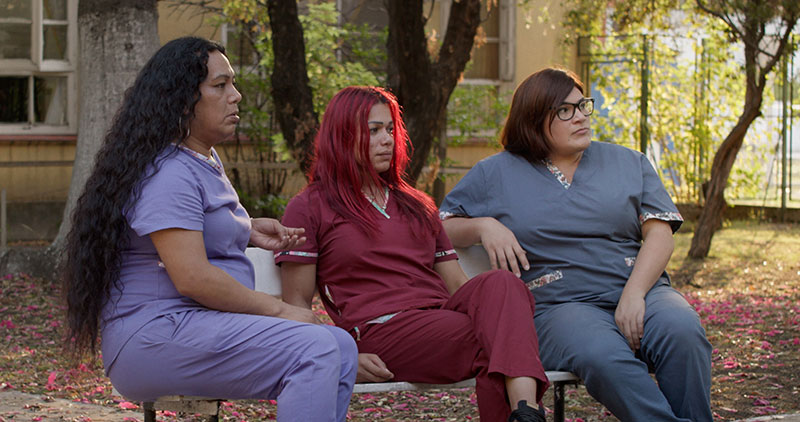
They are the first days of Luciana, Maia and Yenifer as caregivers in an elderly home. As trans women, it is the first time they access formal employment. So far they have only exercised prostitution to survive. With the passing of the days and by sharing life in those isolated halls of the world, caregivers and residents forge increasingly deep links. Little by little, that strange place also becomes a home.
The three caregivers help to eat, walk, learn a trade while taking care and listening. Talks on diverse issues with residents: the care of plants, manicure, love, physical pain, the desire to recover. Caregivers who talk to people who live there, at home, exchange life stories: loneliness, the abandonment they suffered as children while singing, play the guitar, celebrate, and do many activities.
“I’m not going to say if God wants because he always wants. We are the ones who have to do,” says a man who lives at home and wanting to return to work as a mechanic.
They share games, physical activities, some person are in wheelchairs, others walk with difficulty, some have many years, not so many.
Three trans women who talk about their dreams, their projects: “And that today we can afford to reach old, the girls before, no” … “and living and projecting”
“I want to be calm and detoxified to my old age of what society imposes you, you have to work until you can pay your wake and get that chip to be the sexual trans or with the body that you have to reach an age that you have to always be royal,”
They win little, do not reach, but they would like to stay, a new life, another perspective.

Words of the Director
We met several trans women who carried out a training course in care for older adults. The majority exerted prostitution and sought an alternative for their future, by the time the body would no longer endure. For them, thinking about old age was to exercise a historically denied right:The life expectancy of trans people in Argentina remains less than 40. How do you take care of an old man, someone for whom the old age is a privilege?
Movie story
We linked to these trans women, some already worked in a public home. We started to film them, but the pandemic arrived. What we had started was completely discontinued. We couldn’t enter home for a long time. Some residents even died. How do I recommend? With a lot of will, together with Mocha Celis and other institutions, we started a new course for trans caregivers. The need for stability and a future projection, post-pandemic, became stronger than ever and the call for the course was a success. There our new caregivers appeared.
Motivation
As a corollary of the course, the students carried out internships in the Santa Ana Home. We began to film just received caregivers, since their first day as an interns. For them, as for us, the encounter with the home was not easy. It meant looking closely, listening and thinking about things that usually distress us. But over time, along with the caregivers, we began to change our eyes. We stunned links of such empathy, that this caregiver-careful relationship felt like a friendship, or a chosen family, something of great complicity, a tenderness that deserved to be portrayed.
Aesthetic proposal
We filmed them over a year, telling how they grew in the trade next to the endearing people who inhabit the home. The erotic advice that Maia receives from Alicia (80); the common points that Yeni found between his youth and that of Vicky (92); or the passion for the adventure that Luciana and Beto (85) share, which was a lifetime. In this sense, the home, where caregivers and residents share, dream, are frustrated, is one more character in the film. In the day -to -day residence, the most particular ends up being universal. We chose to portray it with the least possible intervention of space, always taking advantage of natural light, using the fixed camera to observe the encounter and let the magic occur.
Current link
Caregivers is an example of public policies that work very well and that are threatened today: public education that formed caregivers; the trans quota that gave them the possibility of exercising a new profession and forging a possible future; The funds that finance the home, which prioritizes people without economic means to access the private sector. Brutal cuts about older people grow alongside hate speeches against diversity. This film seeks to contrast empathy and care, the disdain that the current government has – and many others in the world – about old age, diversity and public.
Data Sheet:
Script and address: Martina Matzkin – Gabriela Uassouf
Photography Directorate: Florencia Mamberti
Assembly: Coti Donoso- Valeria Racioppi
Music: Camila Moreno- Paz Kumelen Berti
Functions: from Thursday 26/6 to Wednesday 2/7 at 3:45 p.m. and 8 p.m. at Gaumont cinema.
INCAA QUILMES, RENZI LA BANDA, SANTIAGO DEL ESTERO, Auditorium Bustriazo Santa Rosa, La Pampa and in Cinema América, Santa Fe.

Source: www.laizquierdadiario.com

